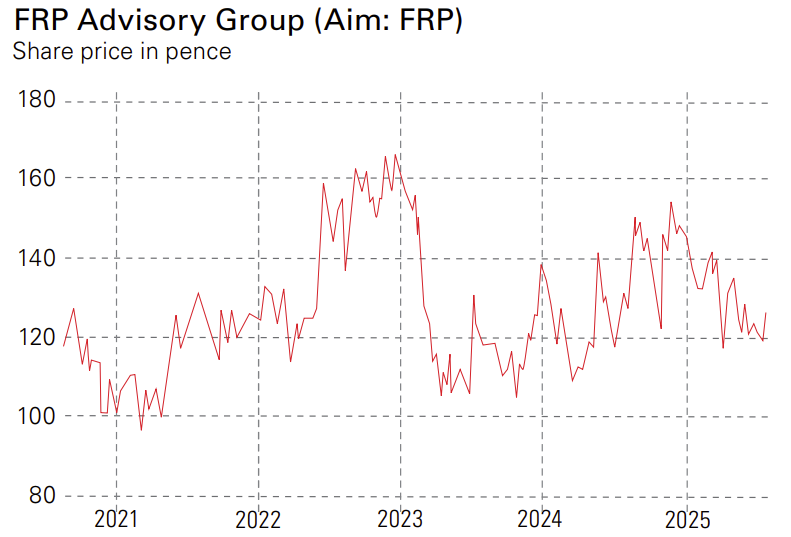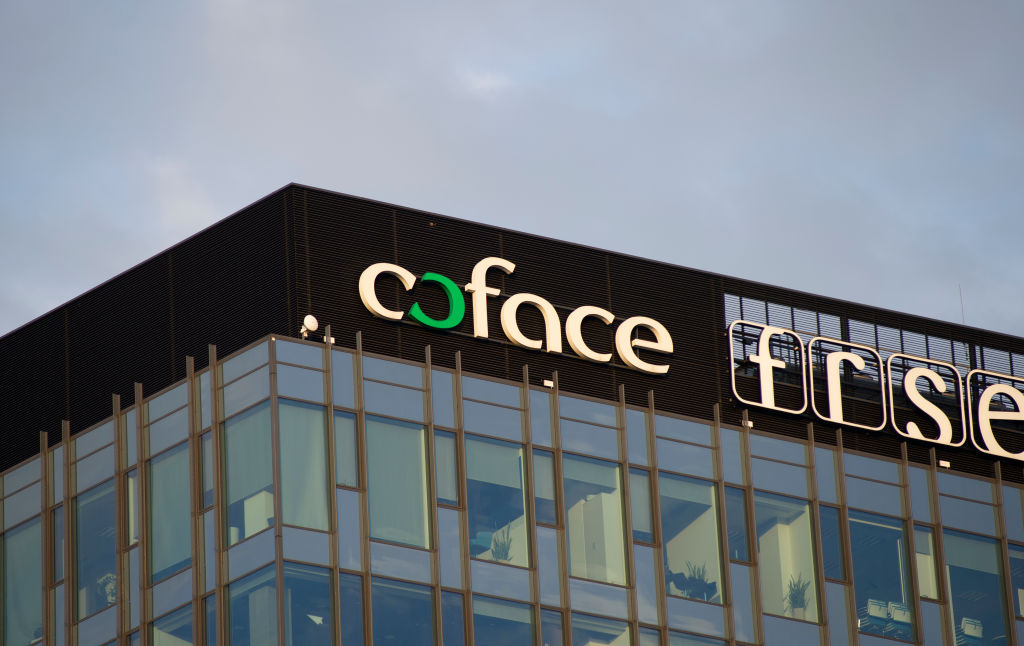FRP Advisory Group – a bargain in a booming market
FRP Advisory Group's past and future growth isn’t reflected in the company’s valuation


Get the latest financial news, insights and expert analysis from our award-winning MoneyWeek team, to help you understand what really matters when it comes to your finances.
You are now subscribed
Your newsletter sign-up was successful
Want to add more newsletters?

Twice daily
MoneyWeek
Get the latest financial news, insights and expert analysis from our award-winning MoneyWeek team, to help you understand what really matters when it comes to your finances.

Four times a week
Look After My Bills
Sign up to our free money-saving newsletter, filled with the latest news and expert advice to help you find the best tips and deals for managing your bills. Start saving today!
FRP Advisory Group (Aim: FRP) is a leading advisory company specialising in restructuring and insolvency services across the UK, with a market share of 12%. Over the past decade, it has expanded and doubled down on its position, increasing its share of the market threefold from 4% at the beginning of the 2010s. The firm has grown despite a relatively benign backdrop for insolvencies and restructurings. According to the Insolvency Service, the number of corporate insolvencies reached a high of 24,000 in 2009 (across England and Wales) before declining to 14,500 a year in 2015, 2016 and 2017, before rising slightly to 17,000 in 2019 and then falling again to a multi-decade low of 12,300 in 2020.
In the years between 2009 and 2019, struggling businesses were supported by low interest rates and modest economic growth, but all that changed in 2022. Government-backed schemes to support businesses helped stave off a complete collapse in activity during the pandemic. But as the schemes were withdrawn and interest rates rose, the number of firms falling into distress also climbed. From a low of 12,631, the number of insolvencies in England and Wales more than doubled to 25,164 in 2023.
FRP Advisory Group's expansion plans
FRP entered this environment in a position of strength. The company floated on the Aim junior market in March 2020, raising £20 million by placing new shares to boost its balance sheet and fund acquisitions. Since then, it has splurged on deals, with 14 completed from the time of the IPO to May 2025 and five deals completed in its 2025 financial year alone.
MoneyWeek
Subscribe to MoneyWeek today and get your first six magazine issues absolutely FREE

Sign up to Money Morning
Don't miss the latest investment and personal finances news, market analysis, plus money-saving tips with our free twice-daily newsletter
Don't miss the latest investment and personal finances news, market analysis, plus money-saving tips with our free twice-daily newsletter
These deals have helped FRP expand beyond its traditional markets. For example, in May, it acquired One Advisory Group, which provides financial reporting and transaction advice, and governance services to more than 100 clients, the majority of which are listed on the London Stock Exchange. All these deals were funded with the company’s plentiful cash resources. Net cash was £33 million at the end of fiscal 2025, a little under 10% of the company’s market capitalisation.
According to Berenberg, which has analysed the company’s M&A-driven revenue expansion, these deals accounted for around half of revenue growth (20.5%) in 2022. Still, in fiscal 2023 and 2024, M&A growth was almost entirely non-existent compared with organic growth of 9.3% and 23.3% respectively. In fiscal 2025, deals accounted for about 40% of the company’s 18.7% top-line revenue growth.
Deals have been core to the company’s growth proposition, but so has the operating environment. Revenue has grown at a compound annual growth rate of 15% over the past decade, says Berenberg, as the number of corporate insolvencies rose significantly. The trend is continuing. The latest figures from the Insolvency Service suggest the number of registered company insolvencies in England and Wales rose 8% month-on-month in May 2025 and 15% year-on-year. Monthly insolvency numbers in the first five months of 2025 were higher than in 2024 and at a similar level to 2023, which saw a 30-year high in the annual number of insolvencies.

FRP Advisory Group's corporate finance arm
FRP has diversified from its core business of restructuring (although that still accounts for 70% to 80% of group revenue). Not all businesses that run into difficulties end up collapsing. Some are acquired, and some manage to agree a deal with creditors. Even here, FRP’s corporate finance business (15% to 20% of revenue) has a strong foothold in the market. It was the 19th-most-active M&A adviser in the year, being involved in 76 successful deals, averaging £20 million in deal value. This suggests FRP is firmly established in that mid-market bracket of firms that form the backbone of the UK economy.
Berenberg has pencilled in pre-deal revenue growth of 7.7% in 2026, 4% in 2027 and 4% in 2028. Earnings are expected to grow at a much faster clip. Thanks to its successful integrations, the company has sector-leading margins, with a 27% earnings before interest, tax, depreciation and amortisation (Ebitda) margin, exceeding its peer group average of 24%. As such, analysts have pencilled in Ebitda growth of 8.9% in 2026 on a margin of 27.5%. Return on capital employed (Roce), a measure of profit for every pound invested, is expected to be 34.9% on a forward basis.
Undervalued growth
These are all very impressive figures, but despite FRP’s growth, profitability and strong balance sheet, the market doesn’t seem to be interested. The stock is trading at a forward price/earnings (p/e) ratio of just 10.2, falling to 9.8 based on 2027 estimates. It also offers a forward dividend yield of 4.6%. Strip out cash, which is expected to hit £39 million at the end of 2026 (assuming the firm does not find any further deals), and the p/e falls to around nine times on a forward basis.
Based on these numbers and compared to the peer group average, Berenberg believes the stock is deeply undervalued. They’ve pencilled in a price target of 220p per share, suggesting a potential upside of around 72% from current levels, excluding the dividend yield on offer. Some caution is warranted, as restructuring is an inherently cyclical business. If interest rates fall and the government decides to take more action to stimulate business in the UK, the number of restructuring and insolvency deals will almost certainly fall. Still, FRP’s management team has demonstrated over the past five years that the company has what it takes to manage the cycle and even grow during tough periods.
This article was first published in MoneyWeek's magazine. Enjoy exclusive early access to news, opinion and analysis from our team of financial experts with a MoneyWeek subscription.
Get the latest financial news, insights and expert analysis from our award-winning MoneyWeek team, to help you understand what really matters when it comes to your finances.

Rupert is the former deputy digital editor of MoneyWeek. He's an active investor and has always been fascinated by the world of business and investing. His style has been heavily influenced by US investors Warren Buffett and Philip Carret. He is always looking for high-quality growth opportunities trading at a reasonable price, preferring cash generative businesses with strong balance sheets over blue-sky growth stocks.
Rupert has written for many UK and international publications including the Motley Fool, Gurufocus and ValueWalk, aimed at a range of readers; from the first timers to experienced high-net-worth individuals. Rupert has also founded and managed several businesses, including the New York-based hedge fund newsletter, Hidden Value Stocks. He has written over 20 ebooks and appeared as an expert commentator on the BBC World Service.
-
 Review: Eliamos Villas Hotel & Spa – revel in the quiet madness of Kefalonia
Review: Eliamos Villas Hotel & Spa – revel in the quiet madness of KefaloniaTravel Eliamos Villas Hotel & Spa on the Greek island of Kefalonia is a restful sanctuary for the mind, body and soul
-
 How a ‘great view’ from your home can boost its value by 35%
How a ‘great view’ from your home can boost its value by 35%A house that comes with a picturesque backdrop could add tens of thousands of pounds to its asking price – but how does each region compare?
-
 Three key winners from the AI boom and beyond
Three key winners from the AI boom and beyondJames Harries of the Trojan Global Income Fund picks three promising stocks that transcend the hype of the AI boom
-
 Three companies with deep economic moats to buy now
Three companies with deep economic moats to buy nowOpinion An economic moat can underpin a company's future returns. Here, Imran Sattar, portfolio manager at Edinburgh Investment Trust, selects three stocks to buy now
-
 Beeks – building the infrastructure behind global markets
Beeks – building the infrastructure behind global marketsBeeks Financial Cloud has carved out a lucrative global niche in financial plumbing with smart strategies, says Jamie Ward
-
 Three promising emerging-market stocks to diversify your portfolio
Three promising emerging-market stocks to diversify your portfolioOpinion Omar Negyal, portfolio manager, JPMorgan Global Emerging Markets Income Trust, highlights three emerging-market stocks where he’d put his money
-
 Coface offers excess profit in an unloved sector
Coface offers excess profit in an unloved sectorCoface is a world leader in trade-credit insurance with key competitive advantages in a niche market
-
 Profit from pest control with Rentokil Initial
Profit from pest control with Rentokil InitialRentokil Initial is set for global expansion and offers strong sales growth
-
 Three funds to buy for capital growth and global income
Three funds to buy for capital growth and global incomeOpinion Three investment trusts with potential for capital growth, selected by Adam Norris, co-portfolio manager of the CT Global Managed Portfolio Trust
-
 PayPoint: a promising stock for income-seekers
PayPoint: a promising stock for income-seekersPayPoint, a household name across Britain, is moving away from its traditional roots toward a digital future. Investors after a steady income should buy in